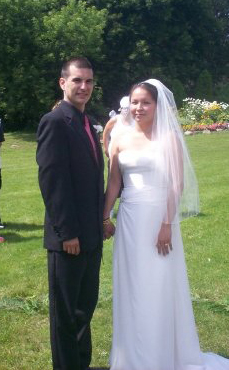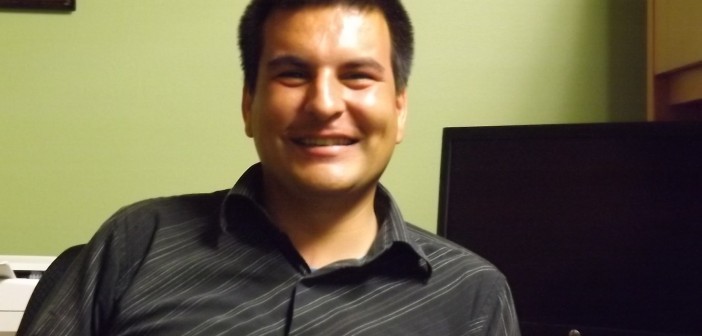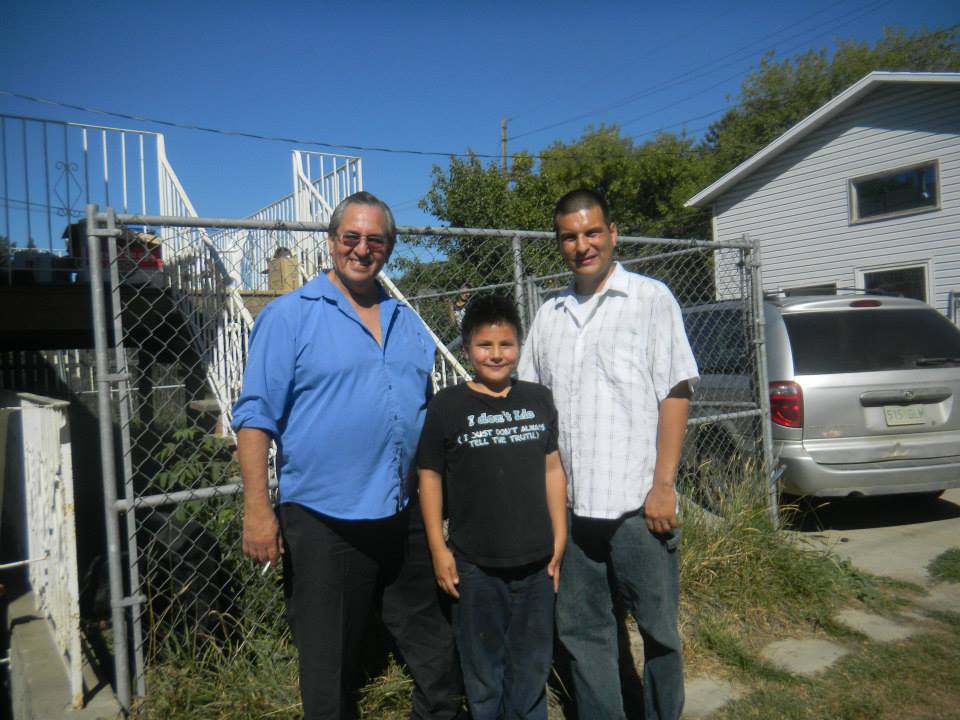Editor’s Note: Tuesday, September 9th is International Fetal Alcohol Spectrum Disorder Awareness Day. The Indian Friendship Centre will be hosting a one day workshop at the Urban Aboriginal Alternative High School at no cost. Matt Sinclair is one of two speakers featured at the event. Please read the attached press release at the end of this article for further details.
*****
When he was just six months old Matt Sinclair was banged in the forehead with a branding iron and marked for life as a lost cause. “My parents were told that I would be nothing and that I might as well be institutionalized.”
But Matt’s adoptive parents weren’t deterred so easily and sought a second opinion and for the first nine years of his life in Saskatoon, Saskatchewan, physiotherapy and speech therapy were a part of his daily routine. His diagnosis of Fetal Alcohol Spectrum Disorder (FASD) was something that was managed with the help of many services working collaboratively. These supports enabled Matt to enjoy all the things every other little boy his age loved to do.
FASD is series of permanent birth defects developed when a mother consumes alcohol while pregnant. There is no known safe time or amount to drink during pregnancy. FASD is a broad spectrum with affects that include stunted growth, damage to the central nervous system, learning disabilities, poor impulse control, skewed social perception and learning disabilities. The most severe diagnosis along the spectrum is fetal alcohol syndrome. Growing up Matt experienced his greatest challenges in the areas of academics, impulse control, time management, social perception and as an adult, managing money.
Interventions that were allowing Matt to grow up productively in Saskatoon were left behind in 1983 when his family moved to Sault Ste. Marie. Now 31 years old, Matt said of those transitional years, “I came to the Sault and there were no supports for me. They thought I was hopeless. I was not meant to succeed. I was pushed in to the cracks.”
Matt struggled academically and socially through school. He had a few friends but experienced bullying on a regular basis. “I wanted to fit in so bad but I missed all the social cues. And I was different. I was in Special Ed classes from the time I started school in the Sault and that just made me a target. I wanted to be so normal but I wasn’t. I wanted to have fun. I wanted to go to parties.”
By the time he was in grade seven the violence of the bullying had escalated and Matt was fighting back. “I was suspended so many times I lost count. I would break someone’s nose or a rib and they’d send me home which was fine with me. By the time I was in grade nine I was ready to fight anyone. I wore a trench coat and tried to look intimidating. It worked and nobody picked on me. I was alienated but I wanted it that way.”
For a youth without a diagnosis of FASD puberty is hard enough. Moving into his mid-teens Matt’s aggression increased and his family didn’t know what to do. “I went into overdrive, more fighting. My hormones were raging but my mind couldn’t keep up. Everything was changing but my mind was still young. So I didn’t understand it until I got much older.”
FASD often presents in the facial features of babies but as the child matures these effects diminish. For this reason FASD is often referred to as an invisible disability.
Matt was in and out of group homes during his teen years and a frequent run away. “I was always in the news. ‘Matt Sinclair is missing again.’ Everybody just sort of got used to it.” By the time he was sixteen years old Matt was a high school drop-out and put his thumb to work.
“When I was sixteen years old there was four of us from Saskatoon on the streets in Toronto. One of us worked at McDonalds and at night we would go panhandling. At the end of the night we’d all sleep by this library, the four of us- looking out for each other. That’s when I started to find out about drinking and all the parties and all the wonderful drugs. I guess it was fun at the time. I didn’t really care. And that’s the way it was for me for a while.”
He managed to see the east coast and west coast on his own before he was eighteen years old. “I even joined the carnival,” he said. After a short pause he threw his head back and laughed. “It’s such a cliché, I know. It was fun at the time. I set up and tore down the rides and operated them in between.”
Just before he hit nineteen his then girlfriend became pregnant. The pregnancy occurred in the fallopian tubes and the twins that she was carrying were lost. The tragic event overwhelmed Matt and he headed back to his roots, to Saskatchewan. He hit the bottle and life pretty hard.
Between the ages of eighteen and twenty-three Matt spent life in and out of jail. “I was in for theft or assault or possession. The courts just put me on probation and watched me come back on breaches. And they watched me fail over and over again.”
There are a disproportionate number of individuals with FASD locked up in the penal system. Some researchers estimate the rate of FASD to be ten times higher inside the Canadian prisons than in the general population. Matt explained that people with FASD are more inclined to trust. Add to that a desire to be accepted those with the diagnosis are easy to exploit. “Gangs love us. We’re easy to manipulate. They think ‘hey this guy will take the rap for me and then he’ll get out and we’ll be buddies again’. You’re always in jail andgangs are always in jail. It’s a no-win situation.”
The courts were aware of Matt’s diagnosis but their reaction was punitive, not rehabilitative. “I never hid the fact that I was FASD but they didn’t acknowledge it. I think it was because I look, talk and act normal. So people think I’m using it as a cop-out. I’m not. It’s a real thing.”
He was twenty-three years old. Against all odds Matt turned his life around. There wasn’t a dramatic precursor or an epiphany moment that led to his turning point. He just tired of the lifestyle. “I knew that I was going to end up dead or in a gang. I don’t know if there was a moment. I just didn’t want that way of life anymore. I became anti-social for a long time. I was avoiding everything. I became a hermit.”
But the lonely lifestyle didn’t suit Matt either. The older he became his awareness about who he was increased. He understood his naivety and that he needed to wrap good people around him. “It was a trial and error process. I met people that were bad news but I was starting to recognize those kinds of people. I was starting to learn that the people in my life who were positive influences were the people that I felt ‘safe’ with.”
 And then along came the girl of his dreams. They met where most romances begin- Plenty of Fish. “We were chatting online and I asked her where she wanted to meet. Well the fair was in town so she said ‘the fair’. I was like ‘oh man. Really? I don’t like going to the fair anymore. I know all those rides aren’t safe,” he laughed as he recalled the moment. “We just hit it off and we were married a year later.”
And then along came the girl of his dreams. They met where most romances begin- Plenty of Fish. “We were chatting online and I asked her where she wanted to meet. Well the fair was in town so she said ‘the fair’. I was like ‘oh man. Really? I don’t like going to the fair anymore. I know all those rides aren’t safe,” he laughed as he recalled the moment. “We just hit it off and we were married a year later.”
The couple have a son together and Matt became a stepfather to his wife’s two daughters. At the beginning of the relationship Matt was hesitant to disclose his diagnosis to his wife. “My experience with telling people about my FASD was that as soon as they found out they treated me different. She had a hard time with it at first because I just seemed ‘normal’. I had a job and everything about me looks ‘normal’. But on the inside I was tripping over and clearing crazy hurdles constantly.”
In 2002 Matt saw a poster advertising the Native Human Services degree offered through Laurentian University. “I saw that poster and I knew that’s what I wanted to do.” He applied to the program and was accepted with mature student standing. “I pushed myself so hard. I just told myself I could do it and that I wasn’t going to end up being institutionalized my whole life.”
He graduated with his degree and an overall grade average of 71%.
It was while pursuing his degree that Matt conceived the position he is serving in now. “It started on a piece of paper for a class project. And it just grew from there. I registered my website – nofasd.comand after I graduated I created my position at the Indian Friendship Centre.”
At the time he was working at the Centre as the ‘unofficial’ expert on FASD. Knowing from personal experience that there was a significant need for increased support for people with the diagnosis Matt proposed his current position as FASD worker to the Centre and was hired through an employment program. “The position was developed because of my own expertise that comes from understanding FASD from a unique perspective. My knowledge of the spectrum is from here to the moon and back. I understand it all. I was in jail. I was on the streets. But now I have a good job and I support a family and a wonderful wife.”
The funding for Matt’s position is temporary. “Permanent funding would secure more things for me. I would like to able to organize outreach and send other workers into different communities that can’t access services where they are.”
Matt works out of the Urban Aboriginal Alternative High School in Sault Ste. Marie. He provides one to one counselling for youth and runs a support group. He works with families who have children with FASD and provides referrals. He also works with adults but emphasized that it is important to provide early intervention strategies.
“In the past there has been two options for people with FASD- jail or the ‘looney bin’. It doesn’t have to be that way. There are a lot of people that are successful. And sometimes the successful people are the people that are somewhere in the middle. Sometimes successful means doing good things and enjoying life.”
Matt’s reality with FASD hasn’t miraculously disappeared but he has adapted effective strategies in his life to cope with them. “I still struggle with impulse control but I’ve learned that it’s important to have an ‘external brain’ in my life. That’s just someone that I can talk to that I trust. And that’s what I tell the kids I work with. You need to find people that won’t take advantage of you and that have your best interest at heart.”
He admits that managing money is still difficult for him. “Money means nothing to me. It used to be nothing for me to blow $1000 on crap. And then my street smarts would kick in. I’d go to the Soup Kitchen or the food bank to eat. But now I don’t deal with my finances anymore, my wife does. I make money and she takes care of it. I’m grateful for that.”
FASD also still has its surprises for Matt. “My joints have really taken a beating. My knees are sore all the time. The structural issues with your bones and any problems with internal organs get worse as you get older. The doctors never really explained to me what the structural issues with FASD were. They just told me I would never walk. I have one leg that’s longer than the other but I’m grateful because it could be much worse.”
About a year ago Matt found his biological mother but they have yet to meet or even speak to one another. “She was very young when she had me. Just 14 years old. When she found out she was pregnant she stopped drinking. That’s why my FASD effects aren’t much worse. I just want to meet her and tell her that I’m ‘ok’, that my life is good. And that I am using my disability as a tool and I’m helping people because of it.”
Matt aims to continue his education and has applied for funding to enrol in the FASD certificate program offered through the Anishinabek Educational Institute. “I can bring the personal experience to the situation and contribute information about practical applications that aren’t always found in the research. But I still want to have a better understanding of FASD terms and the lingo that’s being used around the table.”
Today Matt is a much sought after speaker about his expert on living with and rising above the effects of FASD. As far as he’s concerned reaching out to people living with FASD is what he was born to do.
“I told myself that I was going to make it. I won’t be institutionalized. I pushed myself so hard that now I don’t have to. I’m there and now I can help other people get to that better place too. And it’s a joyful experience because I get to do what I love doing.”
PRESS RELEASE
Contact: Cathy Syrette, Director
Sault Ste. Marie Indian Friendship Centre
1-705-256-5634
On September 9, 2014 at 9am, The FASD working group will be hosting a one day FASD awareness day at the Urban Aboriginal Alternative High School here in Sault Ste. Marie Ontario (241 Albert St. W.).
Our Presenters are:
- Matt Sinclair will share his personal story about “Living with FASD”
- Kathleen Buswa will share experiences as a care giver
FASD. Fetal Alcohol Spectrum Disorder is a reality within Canada and is showing us that there are a high number of people who are and are not diagnosed. People Living with FASD need to understand what it is and how caregivers and social service agencies can provide support.
The FASD day working group is a partnership between the local Indian Friendship Centre, No FASD, FASDFOREVER, FASD Committee in Algoma and the North Shore Tribal Council.
The event will take place at 9 a.m. with a moment of silence at 9:09 to represent the 9th month, 9th day, 9th hour, and 9th minute. After the presentations there will be lunch provided and a walk to Bryan Hayes office for information sharing out in the community. Everyone welcome to this event to “Speak Up it is Our Responsibility.”
What: What is FASD?
Where: Urban Aboriginal Alternative High School 241 Albert St. W.
When: Tuesday September 9, 2014
Admission: No Cost
Registration Information: Maggie Antoniow, 705-256-5634, akwego@ssmifc.ca
For Further Information: Alfreda Trudeau, 705-256-5634, akwego2@ssmifc.ca
Goal: To Speak Up about FASD and that it is our Responsibility.



